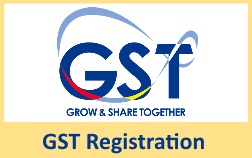Compare and Select the Best GST Registration Services in Singapore for Your Demands
Throughout: The Ultimate Roadmap to GST Enrollment for Businesses Looking For Financial Security
Browsing the complexities of Item and Solutions Tax Obligation (GST) enrollment is a vital step for services aiming for economic security. From recognizing the essential principles of GST to abiding by post-registration guidelines, the process can seem discouraging at very first glimpse. Damaging down the roadmap into convenient steps can simplify the enrollment trip for businesses looking to improve their monetary standing. Let's explore the necessary elements that comprise this supreme roadmap and uncover just how each stage adds to laying a solid structure for financial success.
Recognizing GST Fundamentals
Delving right into the fundamental principles of Item and Provider Tax (GST) is vital for gaining a comprehensive understanding of its effects on services and the economy. GST is a value-added tax obligation levied on a lot of products and services for residential intake. It has actually changed several indirect taxes that existed in the pre-GST era, enhancing the tax obligation framework and boosting simplicity of doing organization in India. Under the GST system, both products and solutions are exhausted at a specific rate, which is figured out based upon their classification. If their annual turnover goes beyond the threshold restriction set by the federal government, organizations are needed to sign up for GST. Input Tax Debt (ITC) is a substantial function of GST, permitting companies to assert debt for tax obligations paid on inputs, reducing the overall tax problem. Recognizing the fundamentals of GST is critical for companies to abide by tax obligation regulations, manage their finances efficiently, and add to the nation's economic development by joining a clear tax system.
Qualification Criteria for Enrollment
To sign up for GST, companies have to fulfill certain qualification criteria developed by the government. The primary eligibility need is that any type of service entailed in the supply of goods or services with a yearly aggregate turn over over the threshold limit set by the authorities need to register for GST. Since the current laws, the threshold limit for GST enrollment is a yearly aggregate turnover of 40 lakhs for businesses running within a state, with the exception of unique category states where the restriction is 20 lakhs. Additionally, certain companies are called for to register for GST irrespective of their turnover, such as interstate vendors, casual taxed individuals, and services responsible to pay tax obligation under the reverse cost device. It is critical for companies to extensively evaluate their turnover and transaction types to establish their GST enrollment responsibilities precisely. Failure to sign up for GST when eligible can lead to fines and legal repercussions, making it necessary for companies to comply with the defined eligibility criteria.
Records Needed for Enrollment
Having actually fulfilled the qualification standards for GST enrollment, companies have to now guarantee they have the requisite files in location to wage the enrollment procedure effectively. The documents needed for GST enrollment usually include proof of company constitution, such as collaboration action, enrollment certification, or consolidation certification for various kinds of companies. Additionally, organizations need to give files developing the principal location of service, such as a rental contract or electrical energy bill. my latest blog post Frying pan card of the organization, in addition to the identity and address evidence of promoters/partners/directors, are necessary for verification functions. Savings account declarations, together with terminated cheques or a duplicate of the financial institution passbook, are needed to validate the monetary details offered during enrollment. Services need to have electronic trademarks all set for the authorized notary. Guaranteeing all these files are organized and easily offered will speed up the GST registration procedure, allowing companies to follow tax obligation guidelines perfectly.
Step-by-Step Enrollment Refine
Beginning the GST registration process includes a series of structured steps to guarantee a compliant and seamless enrollment for organizations. The initial step is to see the GST portal and complete the registration kind with accurate details of business entity. Following this, the candidate obtains a Short-lived Recommendation Number (TRN) which is used to resume the application process if it's not finished in one go.
Next, all needed records based on the checklist given by the GST portal demand to be uploaded. These records typically consist of evidence of company address, registration and identity proofs of promoters, financial statements, and company entity's PAN card.

Post-Registration Conformity Guidelines

Final Thought
To conclude, services seeking financial stability must recognize the essentials of GST, satisfy eligibility requirements, collect essential papers, comply with the step-by-step enrollment process, and abide by post-registration standards - Best GST registration services in Singapore. By adhering to these actions, services can make certain conformity with tax guidelines and preserve monetary security over time
Additionally, specific businesses are called for to register for GST irrespective of their turn over, such as interstate suppliers, casual taxed persons, and companies accountable to pay tax obligation under the reverse fee system.Having actually satisfied the eligibility requirements for GST enrollment, organizations have to currently ensure they have the requisite documents in location to proceed with the registration procedure efficiently. The records needed for GST registration usually include proof of business constitution, such as partnership action, registration certificate, or unification certificate for different types of organizations. Furthermore, services need to provide files establishing the primary area of organization, such as a rental contract or electrical power click resources expense.Starting the GST enrollment procedure includes a collection of organized steps to make certain a smooth and compliant registration for businesses.